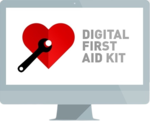Wikimedia Foundation/Legal/Community Resilience and Sustainability/Human Rights/Digital Security Resources
Appearance
Human Rights
Digital Security Resource Center
Welcome to the Digital Security Resource Center! Here you will find articles, tools and links to interactive learning platforms to learn about digital security concepts and inform yourself of the various risks and threats that exist as you interact with digital technologies online. Take the time to go through the resources and learn to better protect yourself, the people you interact with and the communities you support.
For mental health resources, please visit the Mental Health Resource Center.
The Digital First Aid Kit (DFAK) provides some preliminary self-diagnostic support for people facing the most common types of digital threats.
 Internet Basics
Internet Basics
[edit] Assessing Your Risk
Assessing Your Risk
[edit]Improving your digital security means figuring out what your risks are and making decisions about what tools and techniques you might need and are willing to learn to use to protect yourself and those around you.
Overview
[edit]- A short video on what threat modeling is by Vice
- Security Plan by the Electronic Freedom Foundation
- Personas by USEABLE, an initiative of Internews, provides a list of fictional personas and potential risk they may face.
- This booklet by AccessNow includes more personas to help you think about the kind of threats you may face online.
 Safer Browsing
Safer Browsing
[edit]As Wikimedians, web browsing is part of our core activities. How do we keep on doing that while staying safe online?
Overview
[edit]- An Overview of Web Browsing Security by EFF
- An in-depth guide to choosing a VPN by FPF
- An in-depth guide to choosing a web browser by FPF
- The Human Rights Team's Internet outages guide lists tools and software recommended by civil society organizations to help you stay connected in anticipation of an internet outage
Tools
[edit]- Test your browser to see how well you are protected from tracking and fingerprinting by using this tool by EFF
- Blacklight by The Markup helps you scan and reveal user-tracking technologies on websites — and who’s getting your data
- HTTPS Everywhere, by EFF and the The Tor Project, is a browser extension that encrypts your communications with many major websites, making your browsing more secure.
- Privacy Badger, by EFF, is a browser extension that automatically learns to block invisible trackers.
Interactive Learning
[edit]- How to bypass internet censorship by Totem Project
- Learn not to get fooled by confusing designs with this guide by the Tactical Tech Collective.
- Don't fall for tricky URLs by the Tactical Tech Collective.
- Clickclickclick.click reveals the browser events used to monitor our online behaviour
 Secure Accounts and Communication
Secure Accounts and Communication
[edit]Were you aware that sending an email is like sending a postcard, i.e. that anyone having access can read it? As almost all of our communications move online and become digital, lets ensure it does not come at a cost to our privacy and safety.
Overview
[edit]- Communicating with others by EFF
- Two-factor authentication for beginners by FPF.
- Phishing prevention and email hygiene by FPF.
- Why Metadata Matters by EFF
- What is encryption and why is it key to human rights? by APC
- Guide to Secure Group Chat and Conferencing Tools by Front Line Defenders.
- Surveillance Self Defense Guide by EFF
- Find a list of privacy software and services on privacyguides.org
Tools
[edit]- Attachments can be malicious! Dangerzone, by FPF, lets you take potentially dangerous PDFs, office documents, or images and convert them to a safe PDF.
Interactive Learning
[edit] Safer Devices
Safer Devices
[edit]Your Online Identity
[edit]"On the internet nobody knows you are a dog" is a popular axiom that emerged in the early years of the internet. Is that still accurate today?
Overview
[edit]- Read the Human Rights Team's diff posts on doxing and self-doxing
- Doxxing: Tips To Protect Yourself Online & How to Minimize Harm by EFF
- Learn about dorking for a more comprehensive self-doxing, by the Tactical Tech Collective.
- Remove personal data from the internet by CPJ
- Cut down on data collection and protect your personal data with Security Planner by Consumer Reports
- Read on how a user name can keepyou safe
- Find a crowdsourced database of website terms of service, with ratings and gradings on "Terms of Service, Didn't Read"
Interactive Learning
[edit]- How to protect your identity online by Totem Project
- A guide to doxxing and training material by The New York Times Digital Security Education Hub.
- Check if your email address is in a data breach on haveibeenpwned.com
Regionally specific resources
[edit]- Tabla Digital Security Platform is built on the local context in Sudan and aimed at providing protection and advice to journalists, activists and politicians in Sudan
- 7amleh Digital Security Learning Platform is an educational guidance platform designed in the Arabic language
- Digital safety guide for LGBTQ+ activists in Africa
Self organizing
[edit]- Cyberwomen digital security curriculum: Cyberwomen is a digital security curriculum with a holistic and gender perspective, aimed at offering trainers with tools to provide in-person learning experiences to human rights defenders and journalists working in high-risk environments.
- The Organiser's Activity Book: “The Organiser’s Activity Book is a self-learning resource from Tactical Tech’s Data and Activism project.
- Data Detox Workshops: Here you'll find workshop outlines which have been developed and tested by Tactical Tech trainers and Data Detox Kit's global network of partners.

